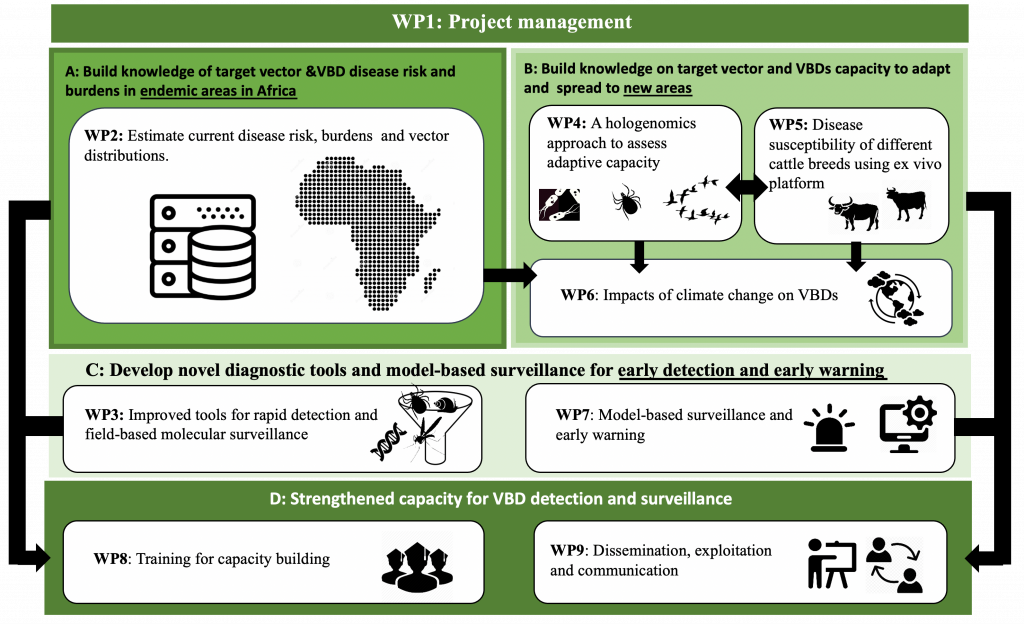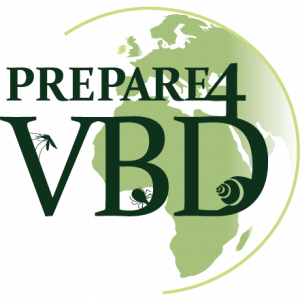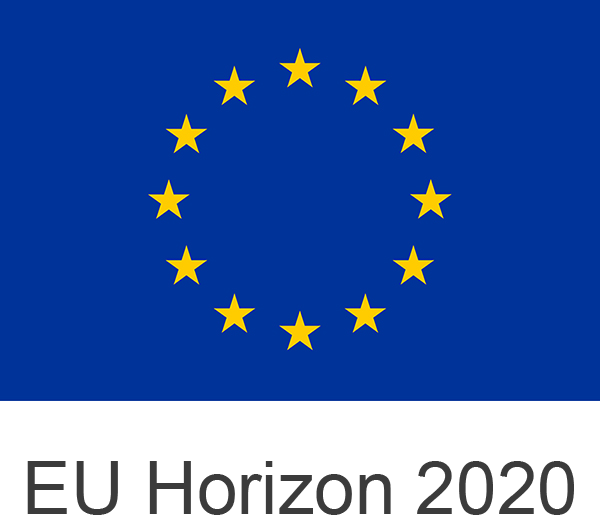Work Plan
The PREPARE4VBD project is divided into 9 inter-linked Work Packages (WPs) as well as an additional WP related to Ethics requirements to achieve our aims and objectives. These include 3 structural and 7 sequential research Work Packages – each relating to the overall project objectives of PREPARE4VBD and to ensure smooth management and coordination of the project (WP1). Adopting a holistic, One Health approach, collectively the PREPARE4VBD WPs will:
A) collate, integrate and provide easy access to existing and novel data on zoonotic vector-borne disease and snail- tick and mosquito vectors distributions, burdens and risk in endemic African countries (WP2);
B) develop and test novel diagnostic tools for early detection and model-based surveillance of the target VBDs (WP3 and WP7);
C) assess their capacity to adapt and spread to new areas using a holo-genomics approach (WP4), hosts (WP5) and climate change impact modelling (WP6);
D) strengthen the capacity for surveillance and detection of the targeted VBDs through training and effective communication of project results and dissemination of freely available data and tools to consortium partners and other relevant stakeholders (WP8 and WP9)

WP1 – Project management
The overall objective of WP1, led by UCPH, is to ensure efficient and timely implementation of the project. The specific objectives are:
- To ensure that the project tasks, milestones and deliverables are achieved on time and in line with the budget
- To secure efficient communication within the consortium and with the European Commission
- To submit periodic and final technical and financial reports
- To observe any potential conflicts and mitigate them immediately and accordingly
WP2 – Estimate current disease risk and vector distributions
This WP, led by SwissTPH, is aimed at project objective 1 – Estimate current disease risk and vector distributions, based on existing data to increase basic knowledge on ecological, environmental and socio-economic risk factors, and estimate overall burden of target diseases in sub-Saharan Africa. The specific WP objectives are:
- To establish a database/pipeline for the mining, sharing and modelling of existing data on the current distribution and prevalence of target vectors and VBDs in the study regions (west, east and Southern Africa).
- To identify disease risk factors and predict the geographical distribution of the disease risk/incidence in the study regions
- To identify climatic suitable factors of vector habitats and map the geographical distribution of vector densities/ occurrence
- To estimate the overall disease burden in the study regions
WP3 - Improved tools for rapid detection and field-based molecular surveillance of VBDs
The aim of this WP, led by icipe, is to develop new robust, easy-to-use inexpensive diagnostic assay platforms and sensitive environmental DNA (eDNA)-based tools for rapid and early detection of mosquito- tick- and snail-borne pathogens to support optimized control and monitoring of the targeted VBDs and their vectors. Tasks include:
- Develop and test efficient VBD-detection pipelines amenable to field-based settings
- Develop and validate environmental DNA (eDNA) to monitor vector and pathogens as a useful environmental surveillance tool for snail-borne trematodes (fasciolosis), including field-testing by partners MAK, NIMR, VCD, UKZN and UNINA in areas with different levels of transmission and eco-epidemiology.
- Pen-side automated diagnosis of snail-borne infections in cattle
- Establish molecular protocols for genomic and metagenomic investigations of vector specimens and environmental samples
WP4 - A hologenomics approach to investigate vector competence and VBD adaptive capacity
The main objective of WP4, led by UCPH, is to ssess the adaptive capacity of vectors and pathogen transmission potential using holo-genomics to estimate risk of spread and establishment in new areas.
We will apply hologenomics to the interactions between vectors, their microbiomes and the pathogens they transmit across a vast gradient from South Africa to Denmark. The main research questions in WP4 is: How does the tick microbiome including pathogens vary across this vast climatic and geographical gradient, and what are the mechanisms underlying tick microbial assemblages? Addressing this question, will provide new insights into the potential adaptive capacity of ticks vectors to host specific pathogens and hereby the ability for the vector to host pathogens and its competence for transmitting diseases.
WP5 - Disease susceptibility of European and African cattle breeds
The overall objective of WP5, led by UBERN, is to investigate the susceptibility of European and African livestock breeds to VBD using in vitro and ex vivo systems.
It is well-accepted that different livestock breeds can show different susceptibilities to specific infectious diseases. Unfortunately, susceptibility data of different livestock breeds and different pathogens of VBD are rather patchy to date. In order to close the many knowledge gaps on breed susceptibilities, this WP aim to build an ex vivo laboratory platform that informs about the different susceptibilities using cells of the immune system (peripheral blood mononuclear cellsPBMCs) collected from different cattle breeds that get infected with different VBD-causing pathogens
WP6 - Impacts of climate change on zoonotic vectors and vectorborne diseases.
This WP, led by UKZN, supported by UCPH, MAK, NIMR and VCD, address project objective 5 – Explore and determine the relative impact of climate change on vector and pathogen distributions and densities, past and future, by examining and modelling the effects of temperature and climate change relative to other environmental changes. Focus will be on snail-borne diseases, but with the potential for extending and adapting the modelling framework to other PREPARE4VBD target VBDs, pending data availability of compiled data in WP2. The WP specific objectives are:
- Determine effects of temperature on the transmission dynamics of a target VBDs across latitudinal and altitudinal gradients, using fasciolosis as a case study.
- Develop state-of-art predictive modelling framework based on integrating statistical- and mathematical models to predict the impacts of climate change on future VBD patterns
WP7 - Model-based surveillance and early warning
This WP relates to project objective 6 – Strengthen model-based surveillance by developing a data-driven methodology for early detection, short-term forecasting (early warning) and assessment of intervention scenarios. The work package specific objectives are:
- Develop and compare data-driven models for early detection of outbreaks and for forecasting disease transmission dynamics
- Develop software for online surveillance of VBD in LMIC settings
WP8 - Capacity building and stakeholder engagement
WP8 relates to the overall project objective 7 – Strengthen capacity for VBD surveillance and preparedness through effective training and policy and community engagement tools across the project and consortium partners. The specific work package objectives are:
- to identify and engage relevant stakeholders in the project and project implementation
- to build VBD research capacity through training
WP9 - Dissemination, Exploitation and Communication
The overall objective is to develop and implement a strategy for dissemination, exploitation and communication of results to maximise the impact of the PREPARE4VBD project results and disseminate the project results across stakeholders. The specific objectives are:
- To communicate about the project to the general public and potential stakeholders
- To engage stakeholders in relevant processes for effective dissemination and exploitation of research findings
- To widely disseminate the results of the project
WP10 - Ethics requirements
The objective is to ensure compliance with the ‘ethics requirements’ set out in this work package.

